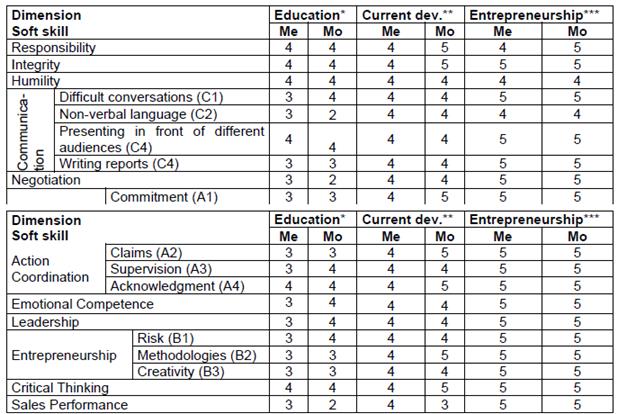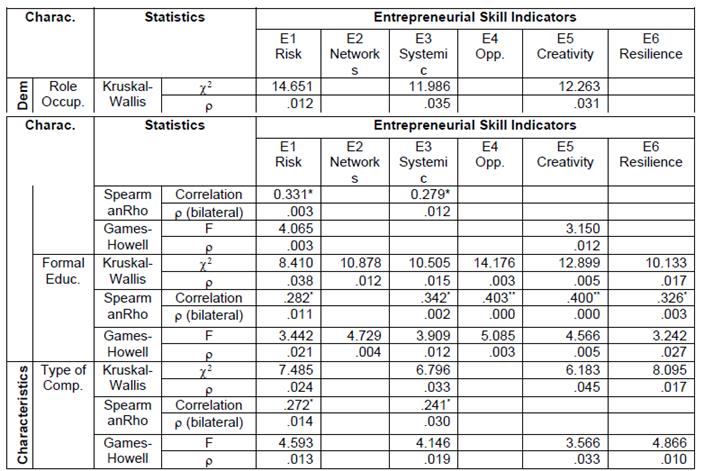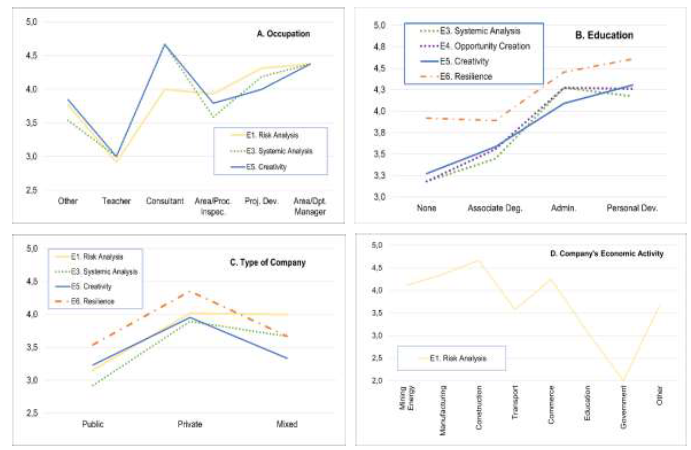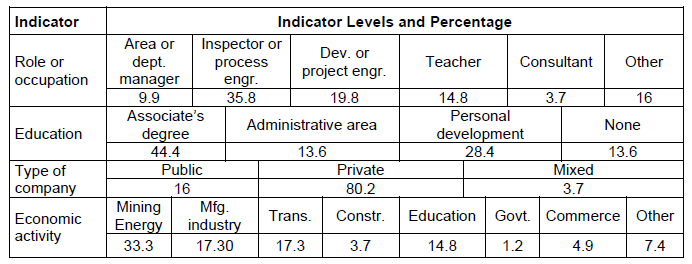I. INTRODUCTION
The decrease in employment, the economic recession, the increase in the young labor force, the privatization of some public companies [1], and the economic crisis due to the COVID-19 pandemics [2] have forced the creation of economic alternatives supported by the high-quality human talent and the research abilities that lead to the creation of micro and small enterprises [3]. In response to these global situations, entrepreneurship based on innovation or technology [4] is one of the vectors helping resolve these drawbacks. Additionally, it provides economic development to a country or region, social scaling of diverse population sectors, and generates employment [5]. Entrepreneurship is defined as an incremental dynamic process of wealth production created by an individual or collective system within an organizational structure through the development of something new, from the conception of ideas to the creation of a business, which demands effort, time and resources and includes financial, psychological, and social risks [6]-[9]. The entrepreneurial capacity allows the creation of strategies ideal for expanding the productivity and the general development of any organization. It comprises four abilities: to innovate and be creative, identify and exploit new business opportunities, willingly take risks, and create and develop business networks [6]-[9]. However, despite the relevance of engineering entrepreneurship, the soft skills (SS) necessary to support an entrepreneurial venture and increase the entrepreneurial abilities have not been studied enough, and it is not clear which SS are necessary to boost entrepreneurship. Thus, this study aims at shedding light on this issue with the following research question: What is the gap between the SS required in engineering entrepreneurship and those developed by engineers?
II. METHODOLOGY
This quantitative research applied a survey [10], [11] which was designed after extensive bibliographical research and considered four dimensions: Demographics & business (D1), Undergraduate education (D2) (Table 1), Current development of SS (D3) (Table 1), SS in entrepreneurship (D4) (Table 2). The validity of the survey was positive, according to the assessment carried out by three experts. Furthermore, the reliability was determined through Cronbach’s alpha coefficient by groups of maximum 20 indicatorsand the result was α = 0.95 which indicates an excellent internal consistency.
Table 1 SS measurement indicators for the D2 and D3 dimensions.
| Categories | Soft Skills Indicators | Reference |
|---|---|---|
| Responsibility | Takes responsibility for solving situations (their own or others’) that obstruct the achievement of their objectives. | [12]-[14] |
| Integrity | Makes professional decisions based on integrity and ethics. | [6], [8], [13], [12] |
| Humility | Admits not knowing something or being wrong, especially in situations of uncertainty or confrontation. | [12] |
| Critical thinking | Makes decisions based on facts, data and reliable information. | [6], [8], [15]-[17] |
| Communication | C1. Effectively deals with difficult or conflictive conversations; C2. Uses and identifies non-verbal language (body posture, arms, legs, eye contact, etc.) during conversation; C3. Effectively presents a subject to an audience with all levels of knowledge (Effectively: use of teaching media and excellent performance); C4. Writes management or technical reports with clarity. | [6], [8], [12], [15], [16], [18]-[21] |
| Negotiation | Conducts effective negotiations (situations with different interests and points of view). | [12], [22] |
| Actions coordination | A1. Undertakes adequate commitments with their work team. (Adequate: High achievement, low reprocessing), A2. Supervises the development of the tasks without generating rejection; A3. Makes claims effectively in case of non-compliance with the acquired obligations; A4. Acknowledges the achievements of the team members. | [12], [23] |
| Emotional competence | Addresses situations calmly, maintaining the emotional balance. | [12], [16], [24]-[28] |
| Leadership | Effectively leads small teams (8 people max.) oriented to meet specific goals. | [6], [8], [13], [15], [16], [18], [19], [21] |
| Entrepreneur-ship | B1. Analyzes the risk level of the possible ways of solving a problem; B2. Analyzes business ideas considering technical support, marketing, logistics, legal, organizational structure, and human capital required; B3. Solves different types of problems creatively. | [6]-[8], [13], [19], [21], [22], [29], [30] |
Rating: 1:Very deficient, 2:Deficient, 3:Acceptable, 4:Good, 5:Excellent.
Table 2 SS measurement indicators for dimension D4.
| Category | Entrepreneurship Indicators |
|---|---|
| Entrepreneurship (references Table 1) | E1. Analysis of the risk level in a project; E2. Quickly reaches out to others or support networks and trusts them. Systemic analysis of a project; E4. Ability to create new opportunities, products or processes; E5. Creative problem solving; E6. Resilience. |
Rating: 1:Unimportant, 2:Minor importance, 3:Moderately important, 4:Important, 5:Very important.
Of the 210 mechanical engineering graduates from Universidad de Pamplona that existed at the moment of the survey application, 81 participated in the study. The calculated error was 8%, and the reliability 95%. The collected data were non-normal and non-parametric according to the bilateral Kolmogorov-Smirnov test (p-value of <0.05), which is why the non-parametric statistic tools such as mean, mode, Spearman correlation coefficient, and Games-Howell post hoc test were used.
III. RESULTS
The results of the Demographics & business dimension relevant to the development of SS are presented in Table 3.
Table 4 presents the respondents’ concept of Undergraduate education (D2), Current development of SS (D3), and SS in entrepreneurship (D4).
Table 4 Development of SS in undergraduate education, current development, and required for entrepreneurship.

Me: Mean, Mo: Mode. *Education, ** Current development, 2:Deficient, 3:Acceptable, 4:Good, 5:Excellent. ***Entrepreneurship, 4: Important, 5: Very important.
A. Skills Required for Engineering Entrepreneurship
This study determined that 15 of the 18 indicators researched (Table 1) are “Very important” (Me=5) (Table 4) in engineering entrepreneurship. However, the other three are “Important” (Me=4). An entrepreneurial engineer is a person with developed technical and soft skills, and the latter are required at the manager or CEO levels [31]. In contrast, this SS development level is not usually considered when engineers decide to be entrepreneurs, increasing the difficulty of the process.
B. Development of Entrepreneurial Skills in Engineers
The surveyed engineers have, on average, a soft skills development level of “Good” (Me=4) with a tendency in some skills to reach an “Excellent” level (Mo=5) (Table 4). This study only considered the Entrepreneurship (Table 2) and Demographics & business (Table 1) indicators with a p-value of <0.05 by using the Kruskal-Wallis ANOVA test (Table 5). Subsequently, these indicators were analyzed using the Spearman correlation coefficient (Table 5) and the Games-Howell post hoc test (Figure 1).
Table 5 Statistics for indicators D1 and D4 with a p-value of <0.05.

*Weak Spearman correlation; **Moderate Spearman correlation
The role or occupation divided into six levels (Teacher, consultant/advisor, area/process engineer/inspector, development/project engineer, area/process manager, other) influences the development of the indicators E1, E3, and E5. E1 and E3 show a positive and moderate Spearman correlation, and the Games-Howell test evidence there is a significant difference in the development of the indicators E1 and E5 (Fig. 1A) in the group of engineers who are teachers and those who are consultants, the latter have a higher development. On the other hand, it is evident that the teachers’ group has the lowest development of E1, E3, and E5 compared to all the other occupations. There is a more significant development level for the area or department managers compared to all the other occupations, except for consultancy.

Fig. 1 Games-Howell in comparison to a) occupation vs. E1, E3, E5, b) education vs. E3, E4, E5, and E6, c) type of company vs. E1, E3, E5, and E6, d) economic activity vs. E1.
The formal education that is not part of a bachelor’s degree was classified as: technical, administrative, or personal development or none. This demographic indicator demonstrated the highest relevance for developing the entrepreneurship indicators and, in general, for all soft skills. The value obtained for the indicators E3, E4, E5, and E6 (Fig. 1B) or, in other words, the development of those skills is lower in engineers with associate’s degrees or without any formal education in comparison to those who had formal education in administration or personal development. Detailed analysis of the influence of this indicator on SS can be found in an article part of this research [32]. Furthermore, the type of company (public, private or mixed) influences the development of E1, E3, E5, and E6 (Fig. 1C). These indicators are less developed in engineers working in public companies than in private or mixed companies. Finally, the company’s economic activity influences the development of E1 (Fig. 1D) weakly and positively, where engineers part of government and education companies have this indicator less developed in comparison to the companies with other economic activities.
C. Undergraduate Education in Soft Skills
According to the program graduates, the training in soft skills during the undergraduate degree was “Acceptable” (Me=3). Humility, Critical thinking, Responsibility, Acknowledgment, Integrity and Presenting in front of different audiences were the most developed skills with a rating of “Good” (Me=4). The other 10 skills were rated as “Acceptable” (Me=3). Finally, Non-verbal language and Negotiation tended toward “Deficient” (Mo=2).
IV. DISCUSSION AND CONCLUSIONS
Regarding the research question, “What is the gap between the SS required in engineering entrepreneurship and those developed by engineers?”, it was evidenced that for engineering entrepreneurship, out of the 18 SS indicators, 15 are “Very important”; the other 3 were “Important”. Which demonstrates that all the soft skills analyzed are essential: Responsibility, Humility, Critical thinking, Communication (divided into Difficult conversations, Non-verbal language, Presenting in front of different audiences, Writing reports), Negotiation, Action coordination (divided into Commitment, Claims, Supervision, Acknowledgment), Emotional competence, Leadership, Entrepreneurship (divided into Risk analysis, Analysis of business ideas considering methodologies, Creativity). However, the surveyed engineers do not achieve the SS development level required for an entrepreneurial venture and even less during undergraduate education. The gap between the current development of SS in engineers and the requirements for engineering entrepreneurship is small since most engineers have an “Important” development level. Nonetheless, the gap extends to engineers who are teachers and engineers working in public companies in relation to the indicators of risk analysis (E1), systemic analysis (E3) and creative problem solving (E5), or for those who do not have formal education or whose education is on a level below a bachelor’s degree. The engineers who have not developed the SS level necessary for an entrepreneurial venture will have to increase it during the project’s development. This increases the expected investment return since they manage less efficiently the conflicts within the work teams, the suppliers or the customers, and have fewer tools and methodologies to lead, motivate and coordinate effective actions for their workers. To bridge this gap, engineers must undertake courses on administration and personal development [32].
On the other hand, the gap between the SS education in the undergraduate program and the SS required for entrepreneurship engineering is broad, as suggested in the bibliographic review. It is essential that the graduates have the possibility of developing their business ideas effectively, so they do not depend on the possible hiring from a company. Therefore, it is relevant and urgent for the engineering programs to include in their curriculum and the teachers’ training the development of SS and entrepreneurship. This will support the development of the startups from their research results and enhance the graduates’ competitiveness.
Finally, this research provides engineers and engineering students with a clearer perspective on the development level of soft skills required for engineering entrepreneurship and allows them to establish different education routes to increase their competitiveness and decrease the risk level when starting a business.
















